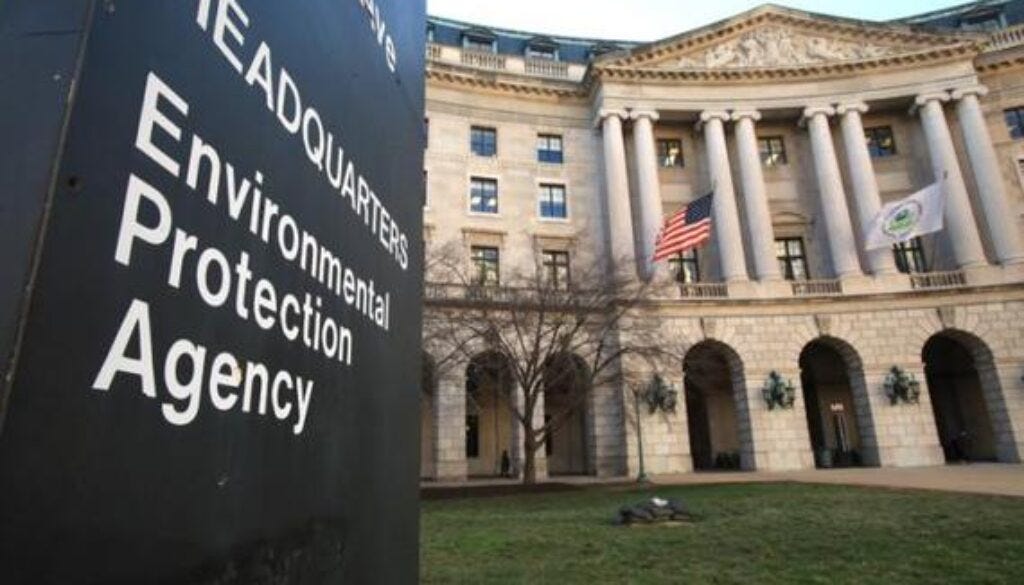Must-read recap: The New Lede's top stories
Curbing slaughterhouse pollution; Iowa cancer rates and ag chemicals; paraquat on Al Jazeera; petition to suspend glyphosate; Ohio PFAS class action lawyers seek rehearing; new youth climate lawsuit.
EPA proposes tighter standards to slash slaughterhouse pollution
Following a legal challenge from environmental groups, the US Environmental Protection Agency (EPA) on Friday proposed new standards aimed at reducing water pollution from slaughterhouses and meat processing plants. The move is the agency’s first such effort in two decades.
The EPA said its preferred option presented in the proposed rule could eliminate about 100 million pounds of water pollution generated by large slaughterhouse and meat processing plants each year.
The plan would put stricter limits in place for nitrogen in liquid waste that is directly discharged into waterways and would establish limitations for phosphorus for the first time. It would also establish the first pretreatment standards for oil, grease, and certain other pollutants. The standards would apply to about 845 of the 3,879 slaughter and meat processing facilities that discharge waste into US waters.
“It’s a very good step in the right direction,” said John Rumpler, senior clean water director for Environment America, a network of state environmental groups. “But by EPA’s own estimates they could be doing more to curb pollution from this sector,” he said. (Read the rest of the story.)
“We can’t sit back” — Amid climbing cancer rates, Iowa health officials eye farm chemicals
Faced with a startlingly high cancer rate in the key US farm state of Iowa, public health leaders are taking the politically precarious step of acknowledging that preventing disease necessitates cutting exposure to potentially cancer-causing chemicals, including those used in agriculture.
In a departure from other state cancer prevention programs, which rarely address environmental risk factors for cancer other than radon, a known cause of lung cancer, Iowa is working to better understand and make the case for limiting exposure to pesticides, commercial fertilizer, and animal manure used and generated by Iowa agriculture, among other environmental contaminants.
“These broader array of environmental risk factors are absolutely there for cancer. But they’re not paid attention to in state cancer control plans,” said Molly Jacobs, an epidemiologist at the University of Massachusetts, who is working with Iowa health authorities. “It’s quite unique that Iowa has addressed this as a priority in their plan. I applaud Iowa for taking on this task of thinking much broader and bigger, and changing this paradigm.” (Read the rest of the story.)
Paraquat ties to Parkinson’s disease featured on Al Jazeera news
Evidence tying the popular weed killer paraquat to Parkinson’s disease is featured this week in an online news segment that includes fresh details about corporate influence over US regulators and suppression of scientific research.
Al Jazeera’s investigative show Fault Lines highlights the reporting of The New Lede (TNL) and the thousands of internal corporate documents obtained by TNL that reveal decades of efforts by Syngenta, paraquat’s longtime manufacturer, to conceal evidence of how chronic exposure to paraquat can cause Parkinson’s disease.
Last month, the “Paraquat Papers” reporting by The New Lede was also the focus of an ABC News Nightline segment.
The New Lede, in collaboration with The Guardian, first revealed a trove of internal Syngenta documents in October 2022 and followed up in subsequent stories, exposing years of corporate efforts to cover up evidence that paraquat can cause Parkinson’s disease. The documents obtained by The New Lede additionally showed evidence of efforts to manipulate and influence the Environmental Protection Agency (EPA) and published scientific literature. The documents also show how the company worked to mislead the public about paraquat dangers, among other secret strategies.
The Fault Lines piece adds to TNL reporting with several on-camera interviews, including one with Dr. Deborah Cory-Slechta, a prominent researcher who has investigated paraquat impacts on brain cells. In the news segment, Cory-Slechta says that “there is a very strong and compelling body of evidence based on the epidemiology studies and what we know from animal models of Parkinson’s disease” that paraquat causes changes in the brain that lead to Parkinson’s. As revealed by TNL reporting, Syngenta worked behind the scenes to keep Cory-Slechta from sitting on an EPA advisory panel, deeming her as a threat to paraquat. Company officials wanted to make sure the efforts could not be traced back to Syngenta, the documents obtained by TNL show. (Read the rest of the story.)
Citing new science, groups petition EPA to suspend glyphosate weed killer
(A version of this article is co-published with The Guardian.)
Citing new scientific research, a coalition of farmworker, public health and environmental advocates on Wednesday filed a legal petition with US regulators demanding they immediately suspend authorization for the controversial weed killing chemical called glyphosate.
The petition, filed with the US Environmental Protection Agency (EPA), alleges that the chemical does not meet the required safety standard set by federal law and the EPA has “no valid assessment demonstrating otherwise.”
If the EPA fails to address the petition, the groups said they will take the agency back to court, where the groups last year successfully garnered a judicial finding that the EPA’s most recent assessment of glyphosate was deeply flawed.
The legal petition comes less than 10 days after the publication of a new scientific study that lends fuel to critics who say glyphosate herbicide products can cause cancer. (Read the rest of the story.)
Ohio PFAS class action lawyers slam US judges; seek rehearing
A federal appeals court should grant a rehearing in a class action lawsuit filed against the makers of toxic PFAS chemicals after a panel of three federal judges disregarded legal precedent and misstated crucial facts in rejecting claims of liability alleged against PFAS makers, according to a petition filed by plaintiffs’ lawyers in the closely watched legal battle.
The request for rehearing comes after last month’s ruling by the Cincinnati, Ohio-based 6th US Circuit Court of Appeals, which reversed a lower court’s approval of the lawsuit brought on behalf of Ohio residents who want PFAS makers 3M, DuPont and others to pay for medical monitoring and studies that will analyze the health impacts of PFAS contamination the residents have been exposed to. The plaintiff’s attorneys have requested either a panel rehearing; a hearing before all judges of the court; or permission for the plaintiff to refile.
Lead plaintiff Kevin Hardwick worked as a firefighter for 40 years and used PFAS-containing foams at work. He alleges that ten companies, including chemical giants 3M, DuPont, and related companies, caused his blood — and the blood of other Ohio residents — to become contaminated with potentially dangerous levels of PFAS chemicals. The judges who rejected the allegations said in their opinion that Hardwick could not trace the chemicals in his blood back to the ten defendants, citing “the thousands of companies that have manufactured chemicals of this general type over the past half-century.” (Read the rest of the story.)
“Sounding the alarm,” a new youth lawsuit seeks climate action by EPA
US environmental regulators have allowed “dangerous levels of climate pollution” to destabilize the climate system with horrific impacts that will worsen over time, according to allegations laid out in a federal lawsuit filed Sunday by a group of California youth.
“We are running from wildfires, being displaced by floods, panicking in hot classrooms during another heat wave,” 15-year-old plaintiff Noah C. said in a statement. He is one of 18 young people named as plaintiffs in the lawsuit against the US Environmental Protection Agency (EPA) filed in US District Court for the Central District of California. (The last names of the plaintiffs are abbreviated due to their ages.) “We feel a constant worry about the future, and all around us no one is moving fast enough.”
EPA Administrator Michael Regan and the US federal government are also named as defendants in the case.
The lawsuit charges the government with knowingly endangering the lives and welfare of the nation’s youth by permitting unsafe levels of greenhouse gas emissions tied to the burning of fossil fuels, in violation of the US Constitution’s rights to life, equal protection, and due process. Additionally, the case contends that EPA has acted beyond its constitutionally delegated authority in allowing extensive climate pollution that harms human health and welfare. (Read the rest of the story.)








